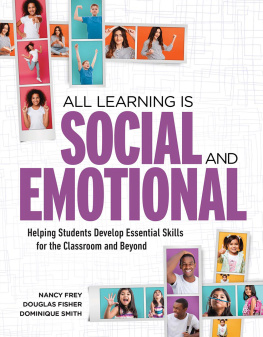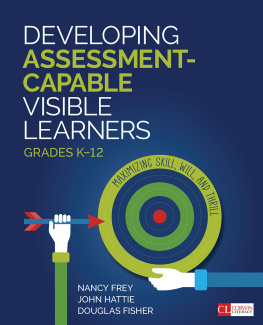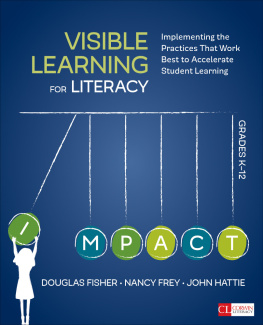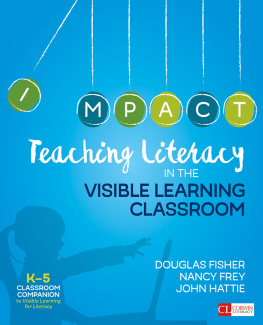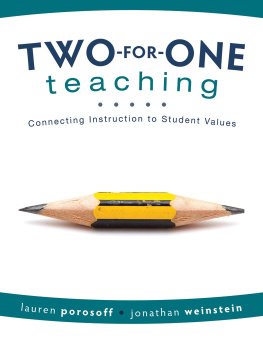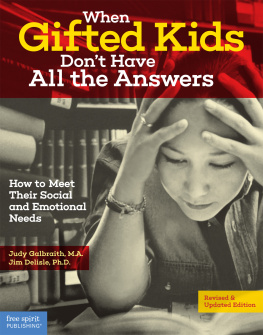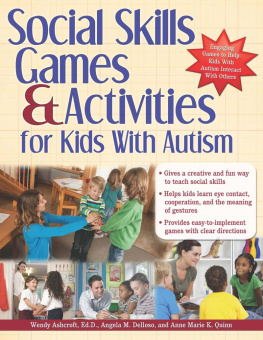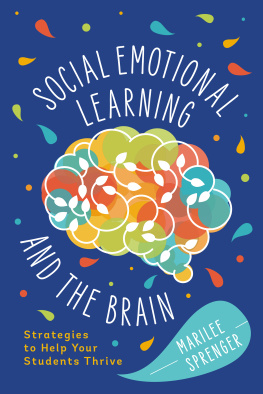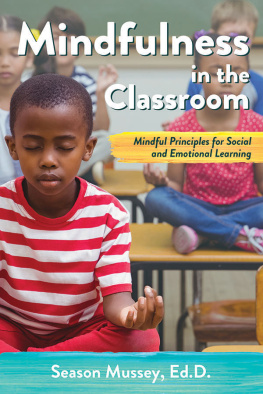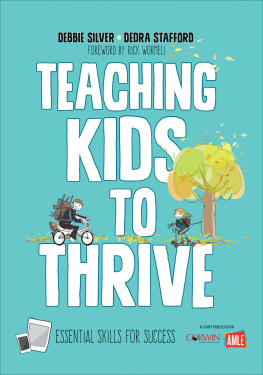Contents
Guide
Pages
Chapter 1
Learning That's Worthwhile
....................
Learning. That's what school is about, right? Regardless of our role in the education system, we all care that students learn. And we spend countless hours trying to ensure that students do learn. But exactly what students are expected to learn in school has been debated for decades. What should we teach? What do students need to learn and be able to do?
In many circles, the answer is simple. Schools need to teach, and students need to master, the core academic subjects. After all, most accountability measures focus on English and mathematics and sometimes science and social studies. For schools to be "successful" in ratings and rankings, their students must perform well on academic measures of achievement. In these schools, every instructional minute is meant to focus on academic skill development.
In other circles, "worthwhile learning" is expanded to include vocational and workplace skills. For example, the Secretary's Commission on Achieving Necessary Skills (SCANS, 1992) focused on one aspect of schooling they felt was missing: what they called the "learning a living" system. In addition to calling for basic skills such as literacy and numeracy, the SCANS report advocates focusing on the thinking skills necessary to put knowledge to work and the personal qualities that make workers dedicated and trustworthy.
Recognition and prioritization of skills that will be valuable in the workplace reflects a growing understanding that schools can influence more than just students' academic content knowledge. For example, California now includes "career pathways" as one of several ways students can demonstrate college and career readiness. In the new California accountability model, high school students must complete 300 hours of career and technical education coursework over three years to be considered "well prepared." Embedded in these courses are noncognitive skills such as working collaboratively with others to resolve problems, generating new products, communicating clearly, and making decisions with integrity. In other words, dispositions undergird the technical skills. These dispositions are aligned with industry competency skills outlined by the U.S. Department of Labor (SCANS, 1992).
In still other circles, worthwhile learning is understood to include mastery of social and emotional skills in additional to academic ones. Proponents of this wider view of learningand obviously, we are among thembelieve explicit instruction focused on the social and emotional aspects of learning (SEL) will result in improved academic learning.
To date, there have been limited efforts to address SEL in school accountability systems. In our home state of California, for example, suspension and expulsion rates are included in the multiple measures of school success. Some critics have argued that this encourages a too-permissive environment, where teachers and administrators are "soft on crime." Advocates counter that the ability to keep students in school is not just a valid measure of school successit's an effective means of increasing it. In order to reduce suspensions and expulsions, schools must help students develop the social and emotional skills that will allow them to engage positively with one another, with their teachers, and with their learning.
A Closer Look at Social and Emotional Learning
SEL has been defined in a number of ways (see Humphrey et al., 2011). In general, it focuses on a set of social, emotional, behavioral, and character skills that support success in school, the workplace, relationships, and the community.
Although these skills affect academic learning, they are often considered "soft skills" or personal attributes rather than explicit targets of instruction. In fact, however, we are teaching SEL even if we don't think we are doing so. As Berman, Chaffee, and Sarmiento (2018) note, "How we teach is as instructive as what we teach. Just as the culture of the classroom must reflect social belonging and emotional safety, so can academic instruction embody and enhance these competencies and be enhanced by them" (p. 13). Teachers communicate these values every time they step in front of a class.
Current efforts to address the social and emotional needs of students can be traced to the work of Waters and Sroufe (1983), who describe competence as the ability "to generate and coordinate flexible, adaptive responses to demands and to generate and capitalize on opportunities in the environment" (p. 80). In other words, competent people are adaptive, they respond to situations in appropriate ways, and they seek opportunities in their communities. Isn't that what we want our students to be able to do? Accordingly, it seems that schools should be invested in developing this type of skill set in students.
The thinking about SEL has evolved over the years. In 1997, Elias and colleagues suggested that SEL comprises a set of competencies, which Durlak, Weissberg, Dymnicki, Taylor, and Schellinger (2011) further described as the ability to
- Recognize and manage emotions
- Set and achieve positive goals
- Appreciate the perspectives of others
- Establish and maintain positive relationships
- Make responsible decisions
- Handle interpersonal situations constructively (p. 406)
A few years later, the Collaborative for Academic, Social, and Emotional Learning (CASEL, 2005) identified five interrelated cognitive, affective, and behavioral competencies:
- Self-awarenessthe capacity to reflect on one's own feelings, values, and behaviors.
- Social awarenessthe ability to view situations from another perspective, respect the social and cultural norms of others, and celebrate diversity.
- Relationship skillsthe ability to initiate and sustain positive connections with peers, teachers, families, and other groups.
- Self-managementthe set of skills that includes self-motivation, goal setting, personal organization, self-discipline, impulse control, and use of strategies for coping with stress.
- Responsible decision makingthe ability to make choices that consider the well-being of oneself and others.
Most recent to this publication, the Wallace Foundation model (see Jones, Bailey, Brush, & Kahn, 2018) identified three domains of SEL:
- Cognitive regulationattention control, inhibitory control, working memory and planning, and cognitive flexibility.
- Emotional processesemotion knowledge and expression, emotion and behavior regulation, and empathy or perspective taking.
- Social/interpersonal skillsunderstanding social cues, conflict resolution, and prosocial behavior.
Does SEL Belong in Schools?
Speaking of the Wallace Foundation, its work is guided by the principle "Say more only when you know more." In All Learning Is Social and Emotional, we have taken this advice to heart. Anyone who carefully follows the research on social and emotional learning is wise to avoid making too many definitive claims about its effect. However, one thing we do believe definitively is that classroom learning always includes cognitive, social, and emotional aspects.
As teachers, administrators, and consultants, we have worked with thousands of students and teachers over the years. We have worked across the general, special, and vocational curriculum in elementary, middle, and high schools, and in nearly every configuration of schooling. Based on these experiences and on our review of the research, we have concluded that because teachers unquestionably influence students' social and emotional development, they have a responsibility to do so in a way that is positive and deliberate.

